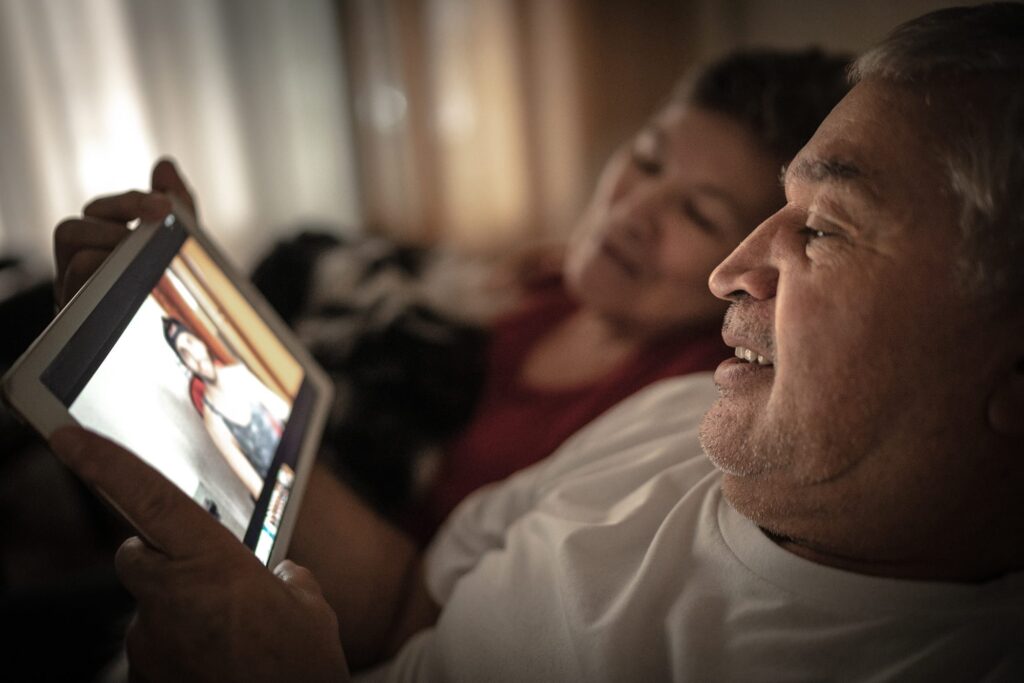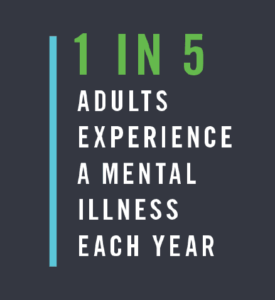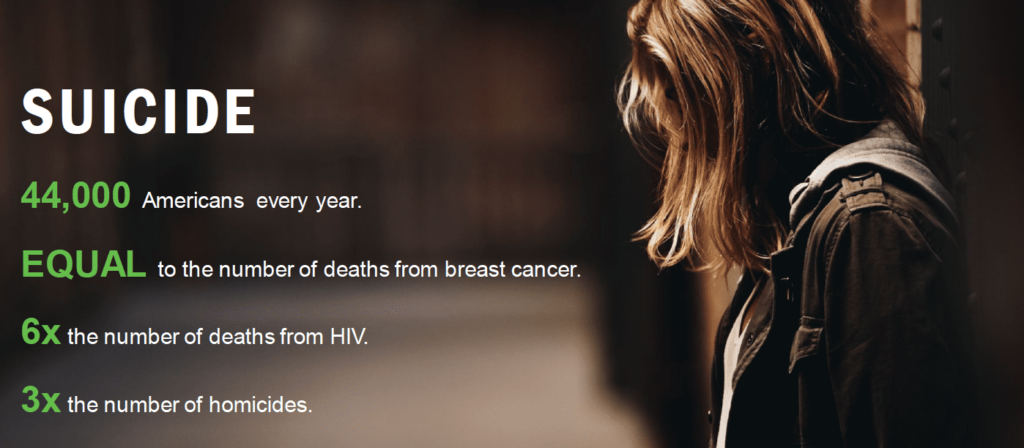
We’re living in a time of uncertainty, and many people are feeling stressed, anxious and panicked. Babette Apland, managing director of Call to Mind, an initiative started by American Public Media, shares how COVID-19 has helped normalize conversations about mental health, explains why taking care of our mental well-being is more important than ever before, and offers four tips on how to elevate your mood.
By Babette Apland, Managing Director of the American Public Media Mental Health Initiative, Call to Mind
Note from the editor: This post was originally published in July 2020 and last updated with new information in February 2021.
We have experienced an unprecedented amount of change and uncertainty in the past year. In March 2020, COVID-19 began to rampantly spread across the United States. Since then, more than 27 million people in the United States have been diagnosed with the coronavirus, and more than 470,000 have died. But COVID-19 sent shock waves across the nation in ways that extended beyond the disease itself. More than 40 million Americans faced unemployment—a rate even higher than the Great Recession of 2007–2009—and many dealt with financial insecurities and stresses. High school seniors missed proms and graduations, college commencement ceremonies were canceled, weddings were postponed, and funerals were unable to take place.
And then, in May, the killing of George Floyd sent waves of pain, outrage and frustration across the nation. There is a heightened recognition that for the past 400 years, Black people in America have experienced the trauma of enslavement, lynchings, police brutality and harassment, workplace discrimination, healthcare inequities, constant barriers of systemic racism, and daily micro and macro aggressions. Many white people are taking a step back and reckoning with their own individual and communitywide beliefs and actions around racism. It’s uncomfortable, and it’s stressful—but also important work.
The 2020 presidential election—one of the most divisive elections in American history—also caused stress and anxiety for people on both sides of the political aisle. In October 2020, 68% of American adults reported that the election was a significant source of stress in their lives, according to the American Psychological Association.
The events that have taken place in 2020 have caused uncertainty, anxiety and stress. Never has taking care of our mental health and well-being felt more important.
The Prevalence of Mental Health Conditions
 Everyone experiences various levels of mental health and well-being. According to the Centers for Disease Control and Prevention (CDC), half of us will experience at least one mental health illness at some point, and 1 in 5 people experience a mental illness each year. Studies show that early intervention is the most important factor in preventing a mental health condition from becoming chronic and a lifelong illness. But there’s a challenge: On average, people wait about 10 years before seeking treatment. We need to change the stigma surrounding mental health.
Everyone experiences various levels of mental health and well-being. According to the Centers for Disease Control and Prevention (CDC), half of us will experience at least one mental health illness at some point, and 1 in 5 people experience a mental illness each year. Studies show that early intervention is the most important factor in preventing a mental health condition from becoming chronic and a lifelong illness. But there’s a challenge: On average, people wait about 10 years before seeking treatment. We need to change the stigma surrounding mental health.
Oftentimes, people suffer in silence, blame themselves, or don’t get the care they need because of a lack of knowledge, fear of discrimination or inadequate access. The consequences are startling. Sixty percent of adults with a mental health condition don’t receive treatment services. And 50% of youths with a mental health condition didn’t receive services in the previous year. Approximately 44,000 Americans die by suicide every year. To give you context, that number is equal to the number of deaths from breast cancer, six times the number of deaths from HIV and three times the number of homicides. We did a survey at American Public Media and found that a majority of Americans are unaware that suicide is the most common cause of death by guns. Most Americans, unsurprisingly, think that homicides are the leading cause.
 These data raise the question: Are we providing mental health and suicide prevention the resources and attention they deserve, particularly compared with other medical conditions and issues? Over the next two decades, mental health will account for 50% of the economic burden of all chronic disease, according to the World Economic Forum. That’s a staggering statistic. It’s in part due to the fact that mental illnesses are so common. But it’s also due to the fact that mental illnesses affect a younger population, unlike other chronic diseases that primarily affect older adults. Seventy-five percent of lifelong mental illness emerges by the age of 24. The U.S. costs for mental health are estimated at $467 billion a year—and that’s an older, out-of-date statistic. It’s most likely markedly higher than that at this point.
These data raise the question: Are we providing mental health and suicide prevention the resources and attention they deserve, particularly compared with other medical conditions and issues? Over the next two decades, mental health will account for 50% of the economic burden of all chronic disease, according to the World Economic Forum. That’s a staggering statistic. It’s in part due to the fact that mental illnesses are so common. But it’s also due to the fact that mental illnesses affect a younger population, unlike other chronic diseases that primarily affect older adults. Seventy-five percent of lifelong mental illness emerges by the age of 24. The U.S. costs for mental health are estimated at $467 billion a year—and that’s an older, out-of-date statistic. It’s most likely markedly higher than that at this point.
Normalizing the Conversation About Mental Health
Indeed, mental well-being is now a concern for everyone, as we’re all coping with a number of changes and emotions. A poll by the Kaiser Family Foundation revealed that about half of Americans reported that the coronavirus is affecting their mental health. But the state of our world has helped normalize conversations about mental health, with even government officials encouraging people to take care of their mental well-being. This universal concern is melting away fears of discrimination, and it’s hopefully creating a lasting platform for change for individuals. Hopefully, it encourages communities and organizations to invest more in mental health.
Taking Care of Your Mental Health
In 2018, American Public Media and Minnesota Public Radio launched a new initiative—“Call to Mind.” This five-year campaign is designed to foster new conversations about mental health. We’ve produced many new stories and shows about how to support children, teenagers, parents, seniors, healthcare workers and more about managing feelings of isolation, loneliness, stress and anxiety. On our website, we have curated resources from respected sources such as the National Alliance on Mental Illness, the CDC and the National Institute of Mental Health.
Taking care of your mental health is incredibly important. Here are four ways to care for your mental well-being during this time.
- Acknowledge that your feelings are normal—and talk about them. Studies show that bottling up your emotions can have a negative impact on your immune system. Talking about what you’re feeling is not only good for your mind, but also good for your body.
- Stick to a routine. Many of us have been working remotely for the past several months, and are likely still doing so. Sticking to a routine is critical to your well-being. Get plenty of rest; eat a healthy, well-balanced diet; and get plenty of physical activity and fresh air. All of these things can help elevate your mood.
- Limit your media intake. Constantly monitoring the news and social media can hurt more than it helps. Turn off the news once in a while and listen to music, go for a walk outside or read a book. Plus, don’t believe everything you read on Facebook or other social media sites. Make sure your news information is coming from trusted sources. As we’re all spending more time online and more time with social media, it’s important to not compare yourself and your day-to-day experiences with others. Social media is a highlight reel—not an accurate representation of a person’s real experiences in their life. During this time, kids can feel pressure too, especially from social media. Make sure to limit your kids’ media exposure, and check in regularly on how they’re feeling.
- Stay connected. We are inherently social animals. But with social distancing, many of us are dealing with loneliness and isolation. Fortunately, there are some things that can help. I think many of us are discovering or have already discovered that proactively planning socially distanced connections can be a big help, whether that’s a happy hour with friends over Zoom or a FaceTime call with your grandkids before bedtime.
If you are dealing with feelings of depression of suicide, please reach out for help. Call the National Suicide Prevention Lifeline at 1-800-273-TALK (8255), or text the Crisis Text Line (text HELLO to 741741). Both services are free and available 24 hours a day, seven days a week. The deaf and hard of hearing can contact the Lifeline via TTY at 1-800-799-4889. All calls are confidential.
Want to hear more? Check out Babette Apland’s podcast episode on mental well-being and the coronavirus.



About The Author: Babette Apland
Babette Apland is the Managing Director, Call to Mind, for American Public Media (APM) and Minnesota Public Radio (MPR). In this role, she leads a national initiative to measurably raise the American public's awareness and understanding of mental health. Babette has held leadership roles at HealthPartners, an integrated health plan and health care delivery system; Melrose Center for Eating Disorders, offering outpatient and residential treatment for all eating disorders; and Phillips Eye Institute, a freestanding inpatient and outpatient eye care center which she developed.
More posts by Babette Apland